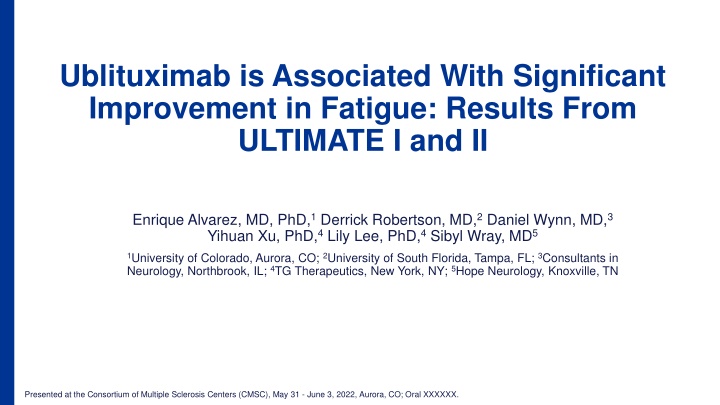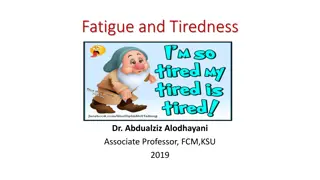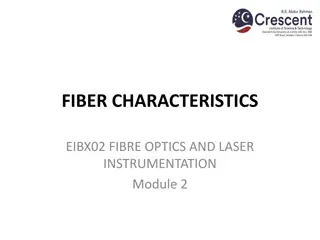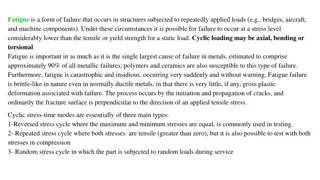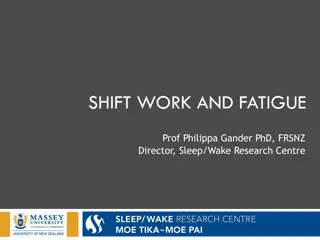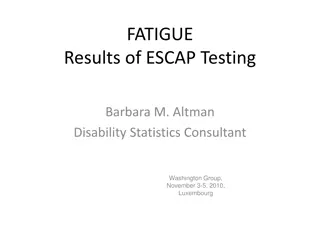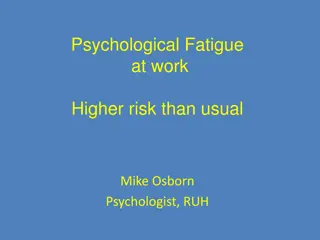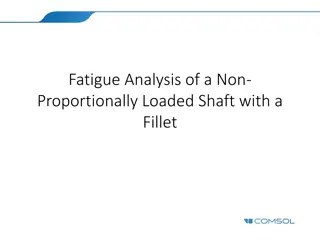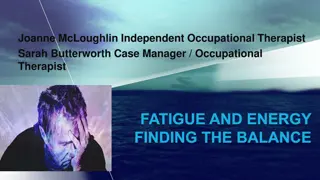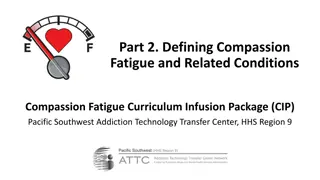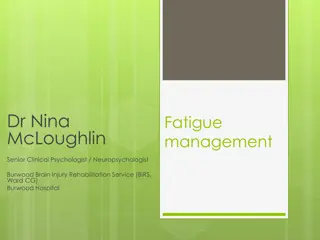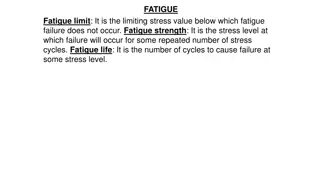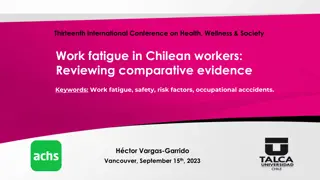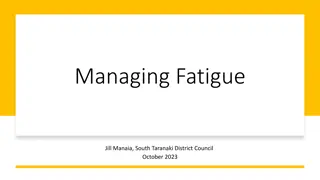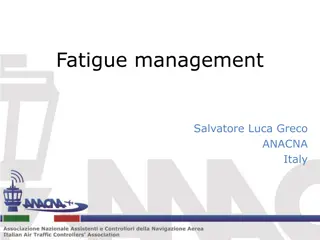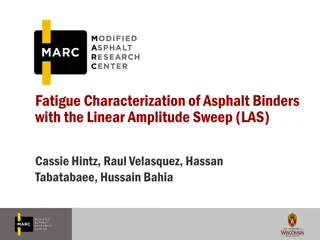Ublituximab Associated With Improvement in Fatigue: Results from ULTIMATE I and II
A study presented at the Consortium of Multiple Sclerosis Centers showed that ublituximab significantly improved fatigue in patients with multiple sclerosis. The research highlighted the impact of MS-related fatigue on patients' quality of life and daily activities. ULTIMATE I and II trials compared ublituximab with teriflunomide, demonstrating improved outcomes in relapse rates and imaging activity. The Fatigue Impact Scale was used to assess cognitive, physical, and psychosocial components of fatigue.
Download Presentation

Please find below an Image/Link to download the presentation.
The content on the website is provided AS IS for your information and personal use only. It may not be sold, licensed, or shared on other websites without obtaining consent from the author.If you encounter any issues during the download, it is possible that the publisher has removed the file from their server.
You are allowed to download the files provided on this website for personal or commercial use, subject to the condition that they are used lawfully. All files are the property of their respective owners.
The content on the website is provided AS IS for your information and personal use only. It may not be sold, licensed, or shared on other websites without obtaining consent from the author.
E N D
Presentation Transcript
Ublituximab is Associated With Significant Improvement in Fatigue: Results From ULTIMATE I and II Enrique Alvarez, MD, PhD,1Derrick Robertson, MD,2Daniel Wynn, MD,3 Yihuan Xu, PhD,4Lily Lee, PhD,4Sibyl Wray, MD5 1University of Colorado, Aurora, CO; 2University of South Florida, Tampa, FL; 3Consultants in Neurology, Northbrook, IL; 4TG Therapeutics, New York, NY; 5Hope Neurology, Knoxville, TN Presented at the Consortium of Multiple Sclerosis Centers (CMSC), May 31 - June 3, 2022, Aurora, CO; Oral XXXXXX.
Disclosures EA has received compensation for advisory boards, lectures, and consultancy with Actelion/Janssen, Alexion, Bayer, Biogen, Celgene/BMS, EMD Serono/Merck, Genentech/Roche, Genzyme, Novartis, Sanofi, and TG Therapeutics, and research support from Biogen, Genentech/Roche, Novartis, TG Therapeutics, Patient-Centered Outcomes Research Institute, National Multiple Sclerosis Society, National Institutes of Health, and Rocky Mountain MS Center. DR has received grant support from Anokion, Atara Biotherapeutics, Biogen, CorEvitas, EMD Serono, Genentech, GW Pharmaceuticals, Janssen, Novartis, PCORI, PRIME CME, Sanofi, and TG Therapeutics; has received consulting fees from Alexion, Biogen, Bristol Myers Squibb, EMD Serono, Genentech, Greenwich Biosciences, Horizon, Janssen, Mallinckrodt, Novartis, Sanofi, and TG Therapeutics; has received honoraria or speaker fees from Alexion, Biogen, Bristol Myers Squibb, EMD Serono, Genentech, Horizon, Janssen, PRIME CME, Sanofi and TG Therapeutics, all outside the submitted work. DW has received compensation from Mylan, Abbvie, Amneal, ANI, EMD Serono, Sanofi, TEVA, Banner Life, Biogen, BMS, Horizon, Immunic, Innocare, GW Therapeutics, Mallinckrodt, TG Therapeutics, Teva, Novartis, Adamas Pharmaceutics and Roche, and as Director, Consultants in Neurology Comprehensive Care Center with National MS Society. SW has received honoraria for advisory boards and/or consultants fees from BMS, Biogen, Genentech/Roche, and TG Therapeutics; research support from Biogen, Celgene, EMD Serono, Genentech/Roche, Genzyme/Sanofi, GW Pharmaceuticals, Novartis, TG Therapeutics. 2
Background Fatigue is the most common MS symptom, affecting approximately 80% of patients1 The impact of MS related fatigue is observed in reduced health-related quality of life (HRQoL), daily activities and work productivity2 ULTIMATE I (NCT03277261) and ULTIMATE II (NCT03277248) are identical, Phase 3, randomized, multicenter, double-blind, active-control, double-dummy studies evaluating the efficacy and safety of ublituximab vs teriflunomide in participants with RMS. Ublituximab significantly improved annualized relapse rate and magnetic resonance imaging activity vs teriflunomide.3 The Fatigue Impact Scale (FIS), a 40-question instrument, was used to assess the impact of ublituximab and teriflunomide on cognitive, physical and psychosocial components of fatigue. 3 1 https://www.nationalmssociety.org/Symptoms-Diagnosis/MS-Symptoms/Fatigue. 2 Berrigan Neurology 2016; 86: 1417 1424.; Janardhan J Neurol Sci 2002; 205: 51 58. 3. Steinman N Engl J Med 2022;387:704.
Drivers of MS Treatment Preferences1 Relative Attribute Importance (RAI) A recent study exploring treatment preferences for MS patients revealed that Other 16.6% Physical Fatigue 22.3% Patients reported the most valued attributes of MS therapy are the impact on physical fatigue and cognitive fatigue Time to MS Progression 18.4% Patients also reported a willingness to accept 5.5 relapses in 2 years and a decrease of up to 7.4 years in time to MS disease progression to improve their fatigue Cognitive Fatigue 22.0% Relapses within 2 years 22.0% 1Tervonen Mult Scler J Exp Transl Clin. 2023 Jan 23;9(1):20552173221150370. Other includes immune system recovery time (RAI =8.0%), drug interactions (RAI =5.5%), monitoring visits (RAI =3.0%). 4
OBJECTIVE To evaluate changes from baseline in fatigue using the FIS with ublituximab vs teriflunomide in pooled post hoc analyses of ULTIMATE I and II. 5
ULTIMATE I and II: Study Design Identical, Phase 3, randomized, multicenter, double-blinded, active-controlled studies conducted in parallel Study Population Treatment (96 Weeks)a Endpoints (at 96 Weeks) Age 18-55 years Primary Teriflunomide 14 mg PO QD until last day of W95 Infusion placebo on same schedule as below RRMS or SPMS (2010 McDonald criteria) ARR Key secondary Total number of Gd+ T1 lesions Total number of new or enlarging T2 hyperintense lesions Proportion of participants with NEDA from Week 24 to Week 96 2 documented relapses within the 2 years prior or 1 relapse in the prior year, and/or 1 Gd+ lesion in the year prior to screening or (randomized 1:1) Ublituximab 150 mg IV on D1 over 4 hours, and 450 mg IV over 1 hour on D15, W24, W48, W72 Oral placebo QD from D1 until last day of W95 EDSS score 0.0-5.5 Neurologic stability 30 days prior to screening The FIS was performed at baseline, Weeks 24, 48 and 96. Scoring is from 0-160, with higher scores indicating increased functional limitation due to fatigue. aAfter completing Week 96, participants entered into a 20-week safety follow-up and were eligible to enroll into an OLE study. ARR, annualized relapse rate; CDI, confirmed disability improvement; CDP, confirmed disability progression; EDSS, Expanded Disability Status Scale; Gd+, gadolinium-enhancing; IM, intramuscular; IV, intravenous; NEDA, no evidence of disease activity; PO, by mouth; QD, once daily; RRMS, relapsing-remitting multiple sclerosis; SC, subcutaneous; SPMS, secondary-progressive multiple sclerosis; W, week. 6
Change From Baseline in Fatigue Impact Scale (FIS): Total Score p=0.03 p=0.02 p=0.01 0 n=529 n=529 n=520 n=512 n=493 n=487 -2 Mean Change from Baseline -3.1 -4 -4.4 -4.4 -6 -6.4 -8 -8.2 -9.1 -10 Teriflunomide Ublituximab -12 Week 24 Week 96 Week 48 The Minimally Important Difference (MID) for FIS in an MS population is a decrease of 9 points.1 7 p-value based on the t-test of change from baseline. 1Rendas-Baum Qual Life Res 2010; 19:1349.
Change From Baseline in Fatigue Impact Scale: Cognitive Dimension Score 0.5 Mean Change From Baseline 0 -0.5 -1 -1.5 -2 * * -2.5 Week BL 24 48 96 Teriflunomide, n 546 529 512 487 Ublituximab, n 540 526 516 491 *p<0.05. Pooled post hoc analysis. Modified intention-to-treat population. p-value based on the t test of change from baseline. BL, baseline. Error bars represent Standard Error of the Mean 8
Change From Baseline in Fatigue Impact Scale: Physical Dimension Score 0 Mean Change From Baseline -0.5 -1 -1.5 -2 -2.5 -3 -3.5 * * * -4 Week BL 24 48 96 Teriflunomide, n 546 529 512 487 Ublituximab, n 542 529 517 493 *p<0.05. Pooled post hoc analysis. Modified intention-to-treat population. p-value based on the t test of change from baseline. BL, baseline. Error bars represent Standard Error of the Mean 9
Change From Baseline in Fatigue Impact Scale: Social Dimension Score 0 -0.5 Mean Change From Baseline -1 -1.5 -2 -2.5 -3 -3.5 -4 -4.5 -5 * -5.5 Week BL 24 48 96 Teriflunomide, n 542 523 505 482 Ublituximab, n 534 521 510 484 *p<0.05. Pooled post hoc analysis. Modified intention-to-treat population. p-value based on the t test of change from baseline. BL, baseline. Error bars represent Standard Error of the Mean 10
Change From Baseline in Fatigue Impact Scale (LS Means) Teriflunomide (n=546) Change in FIS: Total Score Change in FIS: Components Ublituximab (n=543) Cognitive Physical Social Cognitive Physical Social 0.0 0.0 0.0 LS Mean Change From Baseline LS Mean Change From Baseline -0.2 -0.5 -0.17 -0.48 -0.30 -0.4 -1.0 -0.6 -1.5 -0.68 -0.8 -2.0 -1.0 -2.5 -1.2 -3.0 -1.4 -1.33 * -1.49 -3.5 -1.6 -3.60 p=0.046 p=0.004 -4.0 -1.8 *p=0.0036. Pooled post hoc analysis. Modified intention-to-treat population. Mixed-model repeated measures of the change from baseline at all postbaseline time points. The model includes treatment, study, region, baseline EDSS strata, visit, treatment-by-visit interaction, and baseline value, and uses an unstructured covariance matrix, restricted maximum likelihood estimation, and the Satterthwaite method for degrees of freedom. FIS, Fatigue Impact Scale. 11
Proportion of Participants FIS Improved or Unchanged from Baseline to Week 96 Teriflunomide (n=546) FIS Improved or Unchanged: Total Score FIS Improved or Unchanged: Components Ublituximab (n=543) 75 75 * 73.2 p=0.009 p=0.001 Proportion of Participants (%) Proportion of Participants (%) 70 70 69.0 68.2 65.6 65 65 63.2 62.4 61.8 61.0 60 60 55 55 Cognitive Physical Social Cognitive Physical Social Pooled post hoc analysis. Change from Baseline to Week 96. p-value based on chi-square test. Proportion worsened for ubltuximab (31%) vs teriflunomide (39%). FIS, Fatigue Impact Scale 12
Conclusions In a pooled post-hoc analysis of ULTIMATE I and II, ublituximab was associated with a significant improvement in FIS relative to teriflunomide (p=0.046). Ublituximab demonstrated a 9-point improvement at Week 96, previously reported to be the Minimally Important Difference (MID) for FIS in an MS population. Across all timepoints, improvement in FIS was observed in all domains (cognitive, physical, social) and was significant in the physical domain. A significantly higher proportion of ublituximab participants had FIS scores improved or unchanged at Week 96 compared to baseline. 13
Acknowledgments The authors thank the participants and their families for contributions to the ULTIMATE I and II studies, and to Chris Rowland for editorial support for the presentation. The ULTIMATE I and II studies were sponsored by TG Therapeutics. 14
